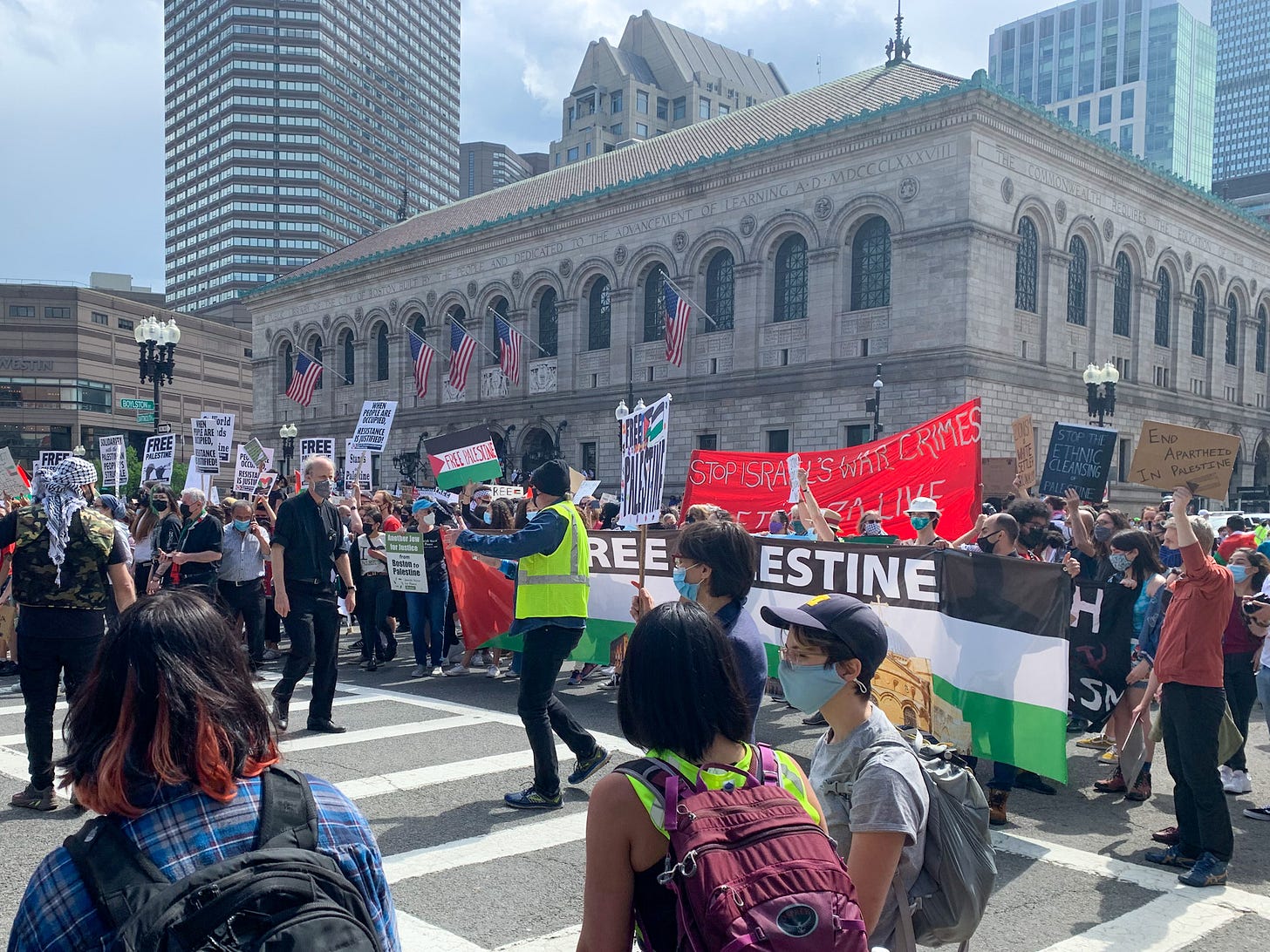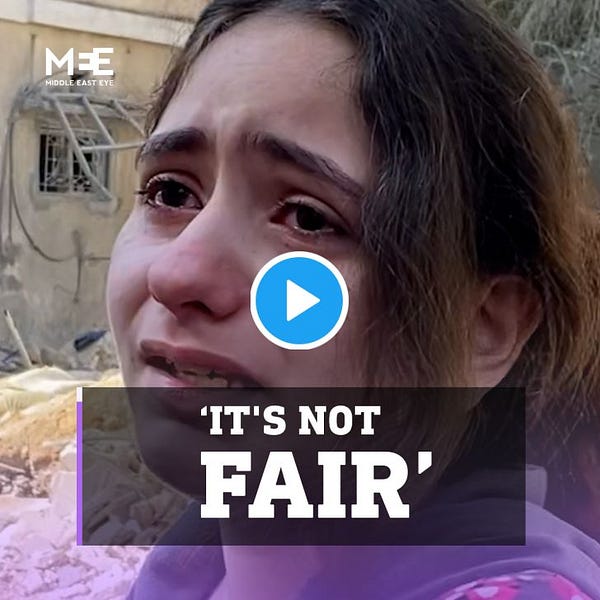Israel-Palestine Conflict a “Political Game” Being Played With Civilians
Palestinian American Lina Salameh insists the situation is "not about Jews versus Arabs."

For weeks, the world has watched in desperation as Israel reignited its war against Palestinians in Gaza and the West Bank. Before the violence claimed the lives of hundreds of Palestinians and Israelis, police action in Jerusalem ignited a series of events that would explode into an all-out war.
On April 13, Israeli police entered Aqsa Mosque in Jerusalem and cut the cables to the loudspeakers broadcasting prayers to Muslim faithful, the New York Times reported. Since then, violence has spread to cities across occupied Gaza.
Social media quickly became inundated with images of protesters and other Palestinians being attacked by Israeli forces and settlers. Clashes at Damascus Gate led to attacks on Jews, which in turn led to organized reprisals against Palestinians.
Palestinians not only rejected the raids on Aqsa Mosque and ongoing violence at Damascus Gate but stood in support of six Palestinian families facing state-sanctioned eviction from their homes in Sheikh Jarrah, a neighborhood in East Jerusalem.
Hamas, a Palestinian entity considered to be a terrorist organization by Israel, quickly responded on May 4. Three days later, militarized Israeli police conducted another raid on Aqsa Mosque. By the following Monday, rocket fire began making its way from Gaza. Israel, in turn, responded with bombs against the Palestinian people.
Since then, Israeli airstrikes have killed at least 217 Palestinians in Gaza, including 63 children. The local Ministry of Health has reported that at least 1,500 people have been injured in the airstrikes, with at least 50 of the injuries considered critical. Another 12 people have been killed in Israel, Middle East Eye reported.
It is far from the first time that violence has erupted between Israel and Palestine, but access to social media has made it incredibly impossible to turn a blind eye to what is happening.
Pero Make It Newsy spoke with Lina Salameh, 24, about growing up as a Palestinian American, the current situation and the world’s reaction to the events in Palestine and Israel.
Salameh, who traces her Palestinian lineage through both parents, grew up hearing stories from her Palestinian-born grandmother and other family members who were forced to leave Palestine for other Middle Eastern countries, and eventually the U.S, she said. Despite having never visited Palestine, Salameh said she very much connected to the culture.
From her Boston-area home, Salameh has used social media to spread awareness about the violence and what it means for Palestinians.
“I want people to know that there are people there, like there are human beings who are moms and daughters and brothers and sisters,” she said. “It’s not a militarized zone where, you know, when people get killed, it’s [the] military.”
“When the news is saying, ‘Oh yeah, Gaza is getting bombed because of Hamas or whatever reason [it] is, it’s people that are getting bombed and children in homes and it’s homes…and they don’t have the resources or the tools or the ability to get the resources or the tools to rebuild,” she added.
“So when a building goes down somewhere else, where there is an influx of money, there’s aid, there’s support, people show up and rebuild. There is no showing up and there’s no rebuilding because no one is holding anyone accountable and no one is showing up to help.”


Salameh said she hopes the public realizes that many Palestinians whose homes are destroyed by Israeli bombs are likely to die under the rubble because of the lack of resources to remove people. She added that the conflict is not about religion.
“It’s not about Jews versus Arabs,” she insisted. “It’s just purely a political game that people are playing and they’re not playing it with other armies, they’re playing it with civilians.”
Asked how she feels when people equate criticism against Israel to anti-semitism, Salameh was adamant that she doesn’t directly associate Jews with Israelis. She noted that there are Arab Jews and citizens of Israel who are not Jewish.
“Judaism and being Israeli and being part of the Zionist movement, to me, don’t intersect,” she said. “So when people say, you’re being anti-Semitic because [you’re] calling [out] Israel, I’m like, ‘No, Israel is getting called out right now because they are actively, violently causing harm to thousands and thousands of people and have been doing so for 70 years.”
Salameh added that she has equal criticism for countries like China that attack and murder Muslims.
Eyes on Palestine
The wide usage of social media has made it easier to share information straight from Gaza and to mobilize supporters abroad. Salameh told Pero Make It Newsy that she is happy to see people learning about what is happening in Palestine.
“It makes me feel better that someone’s finally paying attention,” Salameh said. “I don’t know if I can say it makes me optimistic because we’ve been watching this kind of unfold for 70 years. There have been protests before.”
Salameh expressed some apprehension about what the protests can accomplish, though she said that it warmed her heart to see photos on social media of Americans protesting in New York, Chicago and Boston. Thousands of protesters took to the streets in cities around the world on Nakba Day, a day observed to remember the destruction of the Palestinian homeland in 1948 and the permanent displacement of most Palestinians.
Her own family has a history of joining pro-Palestine protests as well. Her grandfather participated in protests and demonstrations in Lebanon and was kicked out of university for his participation. It was that family experience that led Salameh to forego the protest in Boston and instead find other ways to support the cause.
She hopes that others will follow suit, whether that be protesting, donating to causes that aid Palestinian civilians or other ways to help those being most affected by the violence.
It’s Complicated
“It is a complicated situation,” Salameh said. “It’s not a situation that can be fixed in one diplomatic meeting. Right? But what you’re looking at in its current state is an occupation of people and a…situation of one party having way too much power and not having any balance on the other end.”
There is too much misinformation about the situation in Palestine and Israel, beginning with the often repeated lie that there were no people in the land before Israel was created in 1948, Salameh said. Despite the misinformation, Salameh said she believes that most Israelis don’t support the bombing, harming and killing of a group of people in order to solidify the Israeli state.
At the same time, Salameh said that she is frustrated by those who get out of addressing the situation by saying it’s complicated.
Any resolution needs to begin with Israel ending its war on Palestinians, Salameh argued. She noted that the ongoing violence will only ensure that future generations will continue to get angrier and angrier and less likely to come to a resolution.
“To be able to find answers, you have to look at the other person with respect and as an equal,” she said. “And for sure on both sides, that’s not necessarily happening.”




